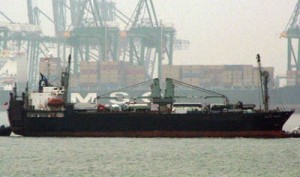China to Operate Oil Wharf in Burma
Originally appeared in The Irrawaddy
January 12, 2011China’s Qingdao Port has signed an agreement with the China National Petroleum Corporation (CNPC) to build and operate a wharf on Burma’s western coastline from which China will send its crude oil brought from Africa and the Middle East via an inland pipeline to Yunnan Province.
On Jan. 7, CNPC Southeast Asia Pipeline Co., Ltd. and Qingdao Port (Group) Co. Ltd. signed a strategic framework agreement in Beijing on operating the oil wharf in the Arakan coastal town of Kyauk Phyu in Burma, according to the CNPC website.
 The state-run China Daily quoted Zhang Hongbo, an industry analyst at China International Trust and Investment Corporation (CITIC) as saying: “This agreement is very important for Qingdao Port because this is the first time the port will extend its management expertise overseas.”
The state-run China Daily quoted Zhang Hongbo, an industry analyst at China International Trust and Investment Corporation (CITIC) as saying: “This agreement is very important for Qingdao Port because this is the first time the port will extend its management expertise overseas.”
CNPC is China’s largest oil company. It is the majority shareholder in the joint-venture project which is constructing a dual oil and gas pipeline from Burma’s western coast to China’s Yunnan Province. Within Burma, the company will build a 793 km-long gas pipeline and a 771 km-long crude pipeline.
The construction of the pipelines officially started on June 3, 2010, after Premier Wen Jiabao, who was then visiting Burma, attended a signing ceremony in Naypyidaw with Burma’s Prime Minister Thein Sein, certifying a shareholder agreement between CNPC and Burma’s state-owned Myanmar Oil and Gas Enterprise (MOGE).
“The agreements defined CNPC Southeast Asia Co., Ltd. as the controlling party of the joint venture to be in charge of the design, construction, operation, expansion and maintenance of the Myanmar oil and gas pipeline,” said the CNPC website.
But the CNPC gave Qingdao Port, the ninth largest port in the world, the right to construct and manage the wharf in Burma through which China will annually channel 22 million tons of oil and 12 billion cubic meters of gas to Yunnan Province.
China has been expanding its contracts around the world to secure the country’s energy security. The cross-border oil and gas pipeline between China and Burma is the fourth after the Kazakhstan-China Crude Pipeline, the Central Asia-China Gas Pipeline, and the Russia-China Crude Pipeline.
Moreover, China has sought the right to operate foreign ports in recent years. The China Ocean Shipping Company (COSCO), the country’s largest shipping company, won the right to operate Piraeus Port in Greece in 2009. China has invested heavily in Kyauk Phyu deep seaport project in Arakan State.
View the original article here.
Tags: Arakan State, Arakan/Rakhine, China, Oil and Gas Pipeline, Shwe Gas ProjectThis post is in: Environmental and Economic Justice
Related PostsU.S.: Lifting Sanctions on Myanmar Puts Human Rights Progress At Risk
Advisory Commission on Rakhine State – A Welcome Investigation into Arakan State’s Human Rights and Humanitarian Crisis
NLD Government Must Lift All Aid Restrictions in Arakan State
United States Commission on International Religious Freedom – Burma: 2016 Annual Report
(၂၉) ႏွစ္ေျမာက္ စစ္ေတြဆန္ျပႆနာေန႔ ဝမ္းနည္းေအာက္ေမ့ဖြယ္ အထိမ္းအမွတ္ သေဘာထားထုတ္ျပန္ခ်က္









 All posts
All posts